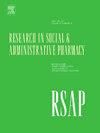药师的疏离和/或失范:国际文献的系统回顾和叙事综合。
IF 3.7
3区 医学
Q1 PUBLIC, ENVIRONMENTAL & OCCUPATIONAL HEALTH
Research in Social & Administrative Pharmacy
Pub Date : 2025-01-29
DOI:10.1016/j.sapharm.2025.01.017
引用次数: 0
摘要
背景:繁荣和归属感是员工幸福和职业成功的关键概念。疏离和失范是两种不同的社会心理疾病,它们会抑制繁荣和归属感。更好地理解这些可能会为防止许多消极的工作终点带来希望,包括倦怠和离职的意图。目的:系统地回顾和叙述地综合全球药剂师的异化和/或失范,回顾所有类型的方法设计,发表在同行评审的期刊上。方法:通过检索8个电子数据库(MEDLINE、Embase、PsycINFO、CINAHL、Cochrane Library、Web of Science - Core Collection、Scopus和谷歌Scholar)和广泛的人工/引文检索,确定已发表的同行评议研究。两名独立的审稿人确定并评价了符合条件的研究,提取了数据并综合了研究结果。综合评估了异化和/或失范的焦点、原因、相关因素和/或后果,并将这些与异化理论的六个演绎主题联系起来:关怀;值;意义;识别;自治;共同承担责任。结果:检索到886篇论文,其中47篇包含在最终结果中。通过综合分析,确定了异化和/或社会反常的十个主要原因;1)不断变化的职业身份,2)报销模式和公司化,3)关注药物而不是人,4)误解和去专业化,5)环境和文化,6)次优社会授权,7)角色与愿望不一致,8)系统利用不足,9)缺乏专业机构,10)价值观冲突。从证据来看,有很高的可信度表明,对关怀、价值观、认可和/或自主性(六个演绎主题中的四个)的抑制与疏离和/或失范有关。结论:异化和/或失范现象在许多国家和地区都存在。这篇论文帮助我们理解这种复杂的心理社会综合症的病因学,这是创造一个包容性职业的必要的第一步,所有的药剂师都可以蓬勃发展。未来的研究需要尝试新的干预措施来纠正这种专业疾病。本文章由计算机程序翻译,如有差异,请以英文原文为准。
Alienation and/or anomie in pharmacists: A systematic review and narrative synthesis of the international literature
Background
Flourishing and belonging are key concepts for the wellbeing of staff and the success of a profession. Alienation and anomie are distinct types of psycho-social ills which inhibit flourishing and belonging. A better understanding of these may offer hope in preventing many negative work endpoints, including burnout and intention to leave.
Objectives
To systematically review and narratively synthesise alienation and/or anomie in pharmacists across the globe, reviewing all types of methodological designs, published in peer-reviewed journals.
Methods
We identified published peer-reviewed research through searching eight electronic databases (MEDLINE, Embase, PsycINFO, CINAHL, Cochrane Library, Web of Science – Core Collection, Scopus, and Google Scholar) and extensive hand/citation searching. Two independent reviewers identified and critiqued eligible studies, extracted data, and synthesised the findings. The synthesis evaluated the focuses, causes, associated factors, and/or consequences of alienation and/or anomie and aligned these to six deductive themes from alienation theory: care; values; meaning; recognition; autonomy; and shared responsibility.
Results
Searches identified 886 papers, with 47 included in the final results. From the synthesis, ten key causes of alienation and/or anomie were identified; 1) Changing Professional Identity, 2) Reimbursement Models & Corporatisation, 3) Focus on Medicines Rather than People, 4) Misunderstanding & Deprofessionalisation, 5) Environments & Culture, 6) Suboptimal Societal Mandate, 7) Roles Misaligned with Aspirations, 8) Systematic Underutilisation, 9) Lack of Professional Agency, and 10) Value Conflict. From the evidence, there was high confidence that inhibitions of care, values, recognition, and/or autonomy (four of the six deductive themes) were associated with alienation and/or anomie.
Conclusion
Alienation and/or anomie are present across many countries and regions. This paper helps us understand the aetiology of this complex psycho-social syndrome, a necessary first step in creating an inclusive profession where all pharmacists can flourish. Future research needs to trial new interventions targeted at correcting this professional malady.
求助全文
通过发布文献求助,成功后即可免费获取论文全文。
去求助
来源期刊

Research in Social & Administrative Pharmacy
PUBLIC, ENVIRONMENTAL & OCCUPATIONAL HEALTH-
CiteScore
7.20
自引率
10.30%
发文量
225
审稿时长
47 days
期刊介绍:
Research in Social and Administrative Pharmacy (RSAP) is a quarterly publication featuring original scientific reports and comprehensive review articles in the social and administrative pharmaceutical sciences. Topics of interest include outcomes evaluation of products, programs, or services; pharmacoepidemiology; medication adherence; direct-to-consumer advertising of prescription medications; disease state management; health systems reform; drug marketing; medication distribution systems such as e-prescribing; web-based pharmaceutical/medical services; drug commerce and re-importation; and health professions workforce issues.
 求助内容:
求助内容: 应助结果提醒方式:
应助结果提醒方式:


